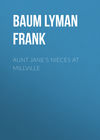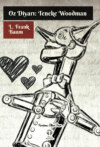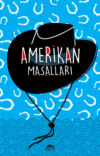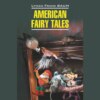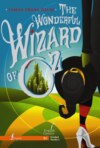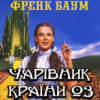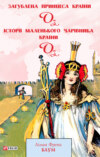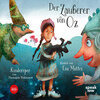Kitabı oku: «Aunt Jane's Nieces at Millville», sayfa 7
CHAPTER XV.
THE MAN IN HIDING
Cautiously the Major approached the cabin, which seemed to have been built as a place for the berry pickers to assemble and pack their fruit. It was constructed of rough boards and had a little window in the side nearest the dwelling house and a door on the opposite side.
Creeping near to the window the Major obtained a clear view of the interior. Upon a dilapidated wicker settee, which had one end propped with a box, partially reclined the form of a man whose right arm was in splints and supported by a sling, while his head was covered with plasters and bandages. The man's back was toward the window, but from his slender form and its graceful poise the Major imagined him young.
Old Nora held the left hand of this mysterious person in a warm clasp, bending now and then to press a kiss upon it, while Hucks busied himself opening the parcel he had brought and arranging various articles of food on a rickety stand at the head of the couch. The old man's smile was more benevolent and cheery than ever, and his actions denoted that strange, suppressed eagerness the Major had marked when he had taken the money.
The three spoke little, and in tones so low that the spy outside the window failed to catch them. Soon the injured man began to eat, feeding himself laboriously with his left hand. But his hunger was quickly satisfied, and then he lay back wearily upon his pillows, while Nora tenderly spread a coverlet over him.
After this the old couple did not linger long. Hucks poured some water from a jug into a tumbler, glanced around the little room to see that everything was in order, and then – after he and Nora had both kissed the bandaged forehead – blew out the candle and retired.
The Major crouched low in the berry bushes until the couple had passed by; then he rose and thoughtfully followed after them.
Whatever Patsy's father might have thought of the Wegg farm mystery before, this adventure convinced him that the girls were not altogether foolish in imagining a romance connected with the place. And, notwithstanding Patsy's loyal defense of Old Hucks, he was evidently tangled up in the affair to a large extent, and could explain if he chose much that was now puzzling the girl detectives.
After careful thought the Major decided to confide in Uncle John, at this juncture, rather than in the nieces; since the latest developments were more fitted for a man's interference.
By good fortune the girls had an engagement the next day, and set out together in the surrey to visit Ethel Thompson and lunch with her in the rose bower, which was the pride of the little school teacher's garden. As soon as they were gone the Major hunted up Uncle John and said:
"Come with me, sir."
"I won't," was the brisk reply; "I'm going fishing, and whoever wishes my society must come with me."
"You'll not catch anything fishing, but you're very liable to catch something if you follow my lead," said the Major, meaningly.
"What's up, Gregory?"
"I'm not sure what it is, John." And then he carefully explained his discovery that an injured man was occupying the cabin in the berry patch, and seemed to be the object of the Hucks' tender care.
"It's the secrecy of the thing that astounds me most, sir," he added.
"If all was open and above board, I'd think little enough of it."
Uncle John's kindly interest was at once aroused, and he proposed that they go directly to the cabin and interview the man in hiding. Hucks being at the time busy in the barn, the two men sauntered into the berry patch without being observed, and then walked briskly along the winding paths until they sighted the building.
Pausing at the window, they saw the man still reclining upon his cot, and holding in his left hand a book – one of Patsy's, the Major observed – which he was quietly engaged in reading. Then they moved around to the door, which Uncle John pushed open.
Without hesitation, the two men entered and stood gazing down upon the strange occupant of the place.
"Good morning," said Mr. Merrick, while the Major nodded a greeting.
The man half arose, moving stiffly.
"Pardon me, sirs," he said, rather startled at the interruption; "I regret that I am physically unable to receive you with more courtesy."
The Major gazed into the partially bandaged face with a glimmer of awakening recognition.
"H-m! Ha! If I'm not mistaken," said he, "it's Joseph Wegg."
"Oh; is it?" asked Uncle John, looking upon the young man curiously.
"What's happened to you, Joseph?"
"Just an automobile accident, sir. The steering gear broke, and we went over an embankment."
"I see."
"Are you Mr. Merrick, sir."
"Yes."
"I owe you an apology for intruding upon your premises in this way, and beg you to forgive the seeming impertinence. But I've been rather unlucky of late, sir, and without this refuge I don't know what would have become of me. I will explain, if you will permit me."
Uncle John nodded.
"After I had squandered the money you paid me, through Major Doyle, for this farm, in a vain endeavor to protect a patent I had secured, I was forced to become a chauffeur to earn my livelihood. I understand automobiles, you know, and obtained employment with a wealthy man who considered me a mere part of his machine. When the accident occurred, through no fault of mine, I was, fortunately, the only person injured; but my employer was so incensed over the damage to his automobile that he never even sent to inquire whether I lived or died. At a charity hospital they tried to mend my breaks and tinker up my anatomy. My shoulder-blade was shattered, my arm broken in three places, and four ribs were crashed in. The wounds in my head are mere abrasions of the scalp, and not serious. But it has taken me a long time to mend, and the crowded, stuffy hospital got on my nerves and worried me. Being penniless and friendless, I wrote to Thomas and asked him if he could find a way to get me to the old farm, for I never imagined you would yourself take possession of the deserted place you had bought.
"Thomas and Nora have cared for me since I was born, you know, and the old man was greatly distressed by the knowledge of my sad condition. He did not tell me you were here, for fear I would hesitate to come, but he sent me the money you had given him and Nora for wages, together with all that the young ladies had kindly given him. I was thus enabled to leave the hospital, which I had come to detest, and journey to my old home. I arrived at the Junction on a night train, and Thomas met me with your surrey, drove me here under cover of darkness, and concealed me in this out-of-the-way place, hoping you would not discover me.
"I regret that I was thus foisted upon you, believe me, sir; but, being here, I have no means of getting away again. Thomas Hucks has had little worldly experience, and cannot realize the full extent of the imposition he has practiced. He feeds me from your table, and is hoarding up his money for me against the time I shall have recovered sufficiently to leave. I think that is the full explanation, Mr. Merrick."
Again Uncle John nodded.
"How are you?" he asked.
"Doing finely, sir. I can walk a little, and my appetite is improving. The doctors said my shoulder would never be very strong again, but I'm beginning to hope they were mistaken. My ribs seem all right, and in another ten days I shall remove the splints from my arm."
"You have no medical attendance?"
"Not since I left the hospital. But I imagine this pure, bracing air is better for me than a dozen doctors," was the cheerful reply.
"And what are your future plans?"
The young man smiled. He was little more than a boy, but his questioner noticed that he had a fine manly face and his eye was clear and steadfast.
"Nothing further than to get to work again as soon as I am able to undertake it," he said.
Uncle John looked thoughtfully, and drummed with his finger upon the little table.
"Joseph," he remarked, presently, "I bought this farm at a price altogether too small, considering its value."
The boy flushed.
"Please do not say that!" he exclaimed, hastily. "I am well aware that I virtually robbed you, and my only excuse is that I believed I would win my fight and be able to redeem the place. But that is over now, and you must not think that because I am ill and helpless I am an object of charity."
"Phoo!" said the little man; "aren't you accepting charity from Old
Hucks?"
"But he stands as a second father to me. He is an old retainer of my family, and one of my ambitions is to secure a home for him and Nora in their old age. No; I do not feel at all embarrassed in accepting money or assistance from Thomas."
"Young man," said Uncle John, sternly, "one of the follies of youth is the idea of being independent of the good-will of your fellow-creatures. Every person who lives is dependent on some other person for something or other, and I'll not allow you to make a fool of yourself by refusing to let me take you in hand. Your brain is affected – "
"It is not!"
"You are mentally unbalanced, and need a guardian. That's me. You are helpless and cannot resist, so you're my prisoner. Dare to defy me, dare to oppose my wishes in any way, and I'll have you put in a straight-jacket and confined in a padded cell. Understand me, sir?"
Joseph Wegg looked into the little man's round face until the tears filled his own eyes and blurred his vision.
"Won't you protect me, Major Doyle?" he asked, weakly.
"Not I," said the Major, stoutly. "This brother-in-law of mine, who connected himself with me without asking permission, is a perfect demon when 'roused, and I'll not meddle with any opposition to his desires. If you value your life and happiness, Joseph Wegg, you'll accept Mr. Merrick as a guardian until he resigns of his own accord, and then it's likely you'll wish he hadn't."
"I don't deserve – " began the young man, brokenly; but Uncle John quickly interrupted him.
"No one deserves anything," said he; "but everyone gets something or other, nevertheless, in this vale of tears. If you'll kindly remember that you've no right to express an opinion in the presence of your guardian, we'll get along better together. Now, then, you're going to leave here, because the place is not comfortable. My guests fill every room in my house, so you can't go there. But the hotel in Millville is a cheerful-looking place, and I've noticed some vine-covered windows that indicate pleasant and sunny rooms. Major, go and tell Hucks to hitch that groaning, balky Daniel to the ancient buggy, and then to drive this young man over to the hotel. We'll walk."
The Major started at once, and Uncle John continued: "I don't know whether this arrangement suits you or not, Joseph, but it suits me; and, as a matter of fact, it's none of your business. Feel able to take a ride?"
The boy smiled, gratefully.
"Yes, indeed, Mr. Merrick," said he, and was shrewd enough not to venture a word of thanks.
CHAPTER XVI.
A MATTER OF SPECULATION
Old Hucks, still smiling, but dreadfully nervous over the discovery of Joe, and Mr. Merrick's sudden activity in the boy's behalf, speedily harnessed Daniel and induced the reluctant steed to amble down the path to the cabin. Leaning on Uncle John's arm, the invalid walked to the buggy and was assisted to mount to the seat beside Thomas. Then away they started, and, although Dan obeyed Hucks more willingly than any other driver, the Major and Uncle John walked 'cross-lots and reached the hotel a good fifteen minutes in advance of the equipage.
The Millville Hotel depended almost entirely for patronage upon the commercial travelers who visited the place periodically to sell goods to the merchants, and these did not come too often, because trade was never very energetic and orders never very large. Bob West boarded at the hotel, and so did Ned Long, a "farm hand," who did sundry odd jobs for anyone who needed him, and helped pay his "keep" by working for Mrs. Kebble when not otherwise engaged.
Mrs. Kebble was the landlady, and a famous cook. Kate Kebble, a slatternly girl of sixteen, helped her mother do the work and waited on the table. Chet Kebble, the landlord, was a silent old man, with billy-goat whiskers and one stray eye, which, being constructed of glass, usually assumed a slanting gaze and refused to follow the direction of its fellow. Chet minded the billiard-room, which was mostly patronized Saturday nights, and did a meager business in fire insurance; but he was "so eternal lazy an' shifless," as Mrs. Kebble sharply asserted, that he was considered more a "hanger-on" of the establishment than its recognized head.
The little rooms of the hotel were plainly furnished but maintained with exceptional neatness.
The one in the east corner of the second floor met with the approval of Uncle John and the Major, and was promptly engaged. It was cheerful and sunny, with outlooks on the lake and the village, and contained a lounge as well as the bed.
When the invalid arrived, he was assisted to this apartment and installed as its permanent occupant.
"Any baggage?" asked Mr. Merrick.
"There's a small trunk lying at the Junction," said Joe; "but it contains little of importance."
"Well, make yourself at home, my boy, and get well at your leisure," remarked Uncle John. "Mrs. Kebble has promised to look after you, and the Major and I will stop in now and then and see how you progress."
Then he went out, engaged Nick Thorne to go to the Junction for the boy's trunk, and selected several things at the store that he thought might be useful to the invalid. Afterward he marched home again beside the Major, feeling very well pleased with his morning's work.
When the girls reached home late in the afternoon, they were thrown into a state of great excitement by the news, briefly related by their uncle, that Joseph Wegg had returned to Millville "considerably smashed" by an automobile accident, and was now stopping at the village hotel for repairs.
They refrained from making remarks upon the incident until they were alone, when the secret council of three decided to make Joe Wegg's acquaintance as soon as possible, to discover what light the young man might be able to throw upon the great mystery.
"Do you know, girls," said Louise, impressively, "it almost seems as if fate had sent Joe Wegg here to be an instrument in the detection of the murderer and robber of his poor father."
"If Joe knew about it, why didn't he track the villain down himself?" inquired Patsy.
"Perhaps he hasn't suspected the truth," said Beth. "Often those who are closely concerned with such tragedies do not observe the evidences of crime as clearly as outsiders."
"Where did you get that information?" demanded Patsy.
"From one of Anna Doyle Oppenheim's detective stories," answered Beth, seriously. "I've been reading up on such things, lately."
"Detective stories," said Louise, reflectively, "are only useful in teaching us to observe the evidences of crime. This case, for example, is so intricate and unusual that only by careful thought, and following each thread of evidence to its end, can we hope to bring the criminal to justice."
"That seems to me conceited," observed Miss Doyle, composedly. "Detective stories don't have to stick to facts; or, rather, they can make the facts to be whatever they please. So I don't consider them as useful as they are ornamental. And this isn't a novel, girls; it's mostly suspicion and slander."
"You don't seem able to be in earnest about anything," objected Beth, turning a little red.
"But I try to be." said Patricia.
"We are straying from the subject now under discussion," remarked Louise. "I must say that I feel greatly encouraged by the sudden appearance of the Wegg boy. He may know something of his father's former associates that will enable us to determine the object of the murder and who accomplished it."
"Captain Wegg was killed over three years ago," suggested Miss Doyle, recovering easily from her rebuff. "By this time the murderer may have died or moved to Madagascar."
"He is probably living within our reach, never suspecting that justice is about to overtake him," asserted Louise. "We must certainly go to call upon this Wegg boy, and draw from him such information as we can. I am almost certain that the end is in sight."
"We haven't any positive proof at all, yet," observed Patsy, musingly.
"We have plenty of circumstantial evidence," returned Beth. "There is only one way to explain the facts we have already learned, and the theory we have built up will be a hard one to overthrow. The flight of Captain Wegg to this place, his unhappy wife, the great trouble that old Nora has hinted at, the – "
"The great trouble ought to come first," declared Louise. "It is the foundation upon which rest all the mysterious occurrences following, and once we have learned what the great trouble was, the rest will be plain sailing."
"I agree with you," said Beth; "and perhaps Joseph Wegg will be able to tell us what the trouble was that ruined the lives of his parents, as well as of Old Hucks and his wife, and caused them all to flee here to hide themselves."
It was not until the following morning that the Major found an opportunity to give the confederates a solemn wink to indicate he had news to confide to them. They gathered eagerly on the lawn, and he told them of the finding of Joe Wegg in the isolated cabin, and how old Thomas and Nora, loving the boy as well as if he had been their own child, had sacrificed everything to assist him in his extremity.
"So ye see, my avenging angels, that ye run off the track in the Hucks matter," he added, smiling at their bewildered faces.
Patsy was delighted at this refutation of the slanderous suspicions that Thomas was a miser and his smiling face a mask to hide his innate villainy. The other girls were somewhat depressed by the overthrow of one of their pet theories, and reluctantly admitted that if Hucks had been the robber of his master and old Will Thompson, he would not have striven so eagerly to get enough money to send to Joe Wegg. But they pointed out that the old servant was surely hiding his knowledge of Captain Wegg's past, and could not be induced to clear up that portion of the mystery which he had full knowledge of. So, while he might be personally innocent of the murder or robbery, both Beth and Louise were confident he was attempting to shield the real criminal.
"But who is the real criminal?" inquired Patsy.
"Let us consider," answer Louise, with the calm, businesslike tone she adopted in these matters. "There is the strolling physician, whom we call the Unknown Avenger, for one. A second suspect is the man McNutt, whose nature is so perverted that he would stick at nothing. The third suspicious individual is Mr. Bob West."
"Oh, Louise! Mr. West is so respectable, and so prosperous," exclaimed
Patsy.
"It's a far jump from McNutt to West," added Beth.
"Leaving out Hucks," continued Louise, her eyes sparkling with the delightful excitement of maintaining her theories against odds, "here are three people who might have been concerned in the robbery or murder. Two of them are under our hands; perhaps Joseph Wegg may be able to tell us where to find the third."
They pleaded so hard with the Major to take them to call upon the injured youth that very day, that the old gentleman consented, and, without telling Uncle John of their plans, they drove to Millville in the afternoon and alighted at the hotel.
The Major went first to the boy's room, and found him not only very comfortable, but bright and cheerful in mood.
"At this rate, sir," he said, smilingly, "I shall be able to discharge my guardian in quick time. I'm twice the man I was yesterday."
"I've brought some young ladies to call upon you," announced the Major.
"Will you see them?"
Joe flushed at first, remembering his plastered skull and maimed condition. But he could not well refuse to receive his callers, whom he guessed to be the three girls Old Hucks had praised to him so highly.
"It will give me great pleasure, sir," he replied.
An invalid is usually of interest to women, so it is no wonder that the three young ladies were at once attracted by the bright-faced boy, who reclined upon his couch before the vine-covered windows. They thought of Ethel, too, and did not marvel that the girl grieved over the loss of this friend of her childhood.
Joe had to recount the adventure with the automobile, which led to his injuries, and afterward give an account of his life at the hospital. That led, naturally, to the timely assistance rendered him by the faithful Thomas, so that Louise was able to broach the subject nearest her heart.
"We have been greatly interested in your old servants – whom we acquired with the farm, it seems – and all of us admire their simplicity and sincerity," she began.
"Nora is a dear," added Beth.
"And Thomas is so cheerful that his smile is enough to vanquish any attack of the blues," said Patsy.
"The Hucks are the right sort, and no mistake," declared the Major, taking his cue from the others.
This praise evidently delighted the boy. They could have found no more direct way to win his confidence.
"Nora was my mother's maid from the time she was a mere girl," said he; "and Thomas sailed with my father many years before I was born."
They were a little surprised to hear him speak so frankly. But Louise decided to take advantage of the opening afforded her.
"Nora has told us that some great trouble came to them years ago – a trouble that also affected your own parents. But they do not wish to talk about it to us."
His face clouded.
"No, indeed," said he. "Their loving old hearts have never recovered from the blow. Would you like to know their history? It is a sad story, and pitiful; but I am sure you would understand and appreciate my old friends better after hearing it."
Their hearts fairly jumped with joy. Would they like to hear the story? Was it not this very clue which they had been blindly groping for to enable them to solve the mystery of the Wegg crime? The boy marked their interest, and began his story at once, while the hearts of the three girls sang-gladly: "At last – at last!"
